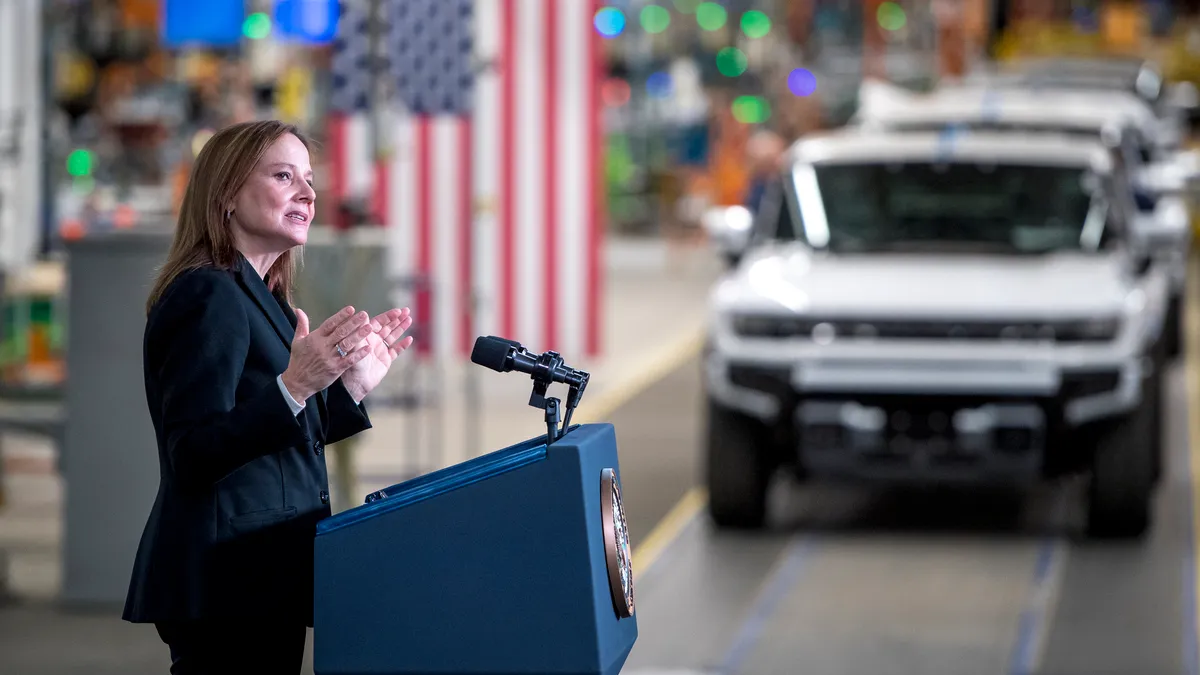General Motors has hit roadblocks as it works to ramp EV production, but analysts say that doesn’t mean the automaker’s playing catch up.
Ultium Cells, GM’s joint venture with LG Energy Solution, began producing batteries designed for the automaker’s EV platform at its first plant in Ohio in late August.
But in October, CEO Mary Barra delayed plans to produce 400,000 EVs in North America by six months after being unable to scale battery production as quickly as expected, in part because it took longer to train its 1,000-plus workforce. Cells from the Ohio plant were needed to accelerate production of its existing EV models, including its Hummer pickup which is nearing a two-year ramp up.
While GM now expects vehicle production to increase in the second half of 2023, in line with its Ultium plant launches, the automaker's timeline lags behind others in the EV space.
Ford, for example, has employed a strategy that has allowed it to ramp production faster, Stephanie Brinley, principal automotive analyst for S&P Global Mobility, said in an interview. The company has reworked its existing gas vehicle models to equip them with battery packs.
In contrast, GM has forged ahead with a dedicated EV platform and batteries.
“Ultium is an all-new ground up,” Brinley said. “GM is taking it a bit more slowly and trying to be a bit more careful, but they’re also starting kind of from scratch.”
While both companies have taken a different approach, Ford has started to follow suit with its own pure-play EV models, and take a longer view of electrifying its fleet.
For the most part, GM’s strategy has hinged on preparing for mid to long-term demand.
From building dedicated EV platforms and battery plants to securing related supply investments, Barra said, the company is cultivating an EV supply chain designed to provide a “long-term competitive advantage.”
The automaker signed a spate of direct sourcing agreements for critical raw battery materials last year, as well as formed a partnership to fund EV battery recycling technology. Most recently, GM announced plans to invest $650 million in Lithium Americas to help develop a large lithium mine in Nevada.
GM’s focus on developing agreements to source minerals for its Ultium batteries will prove “critical over the next few years,” said Michelle Krebs, executive analyst for Cox Automotive.
“Every automaker will be scrambling for these kinds of deals so GM is being aggressive in going after them early,” Krebs added.
While the EV race is well underway, it is years from the finish line.
“The transition from internal combustion to electric vehicles is an incredibly long-term game, and as we’ve seen in the past two or three years, external situations can impact all of your plans and change them,” Brinley said. “What [GM is] doing is saying, ‘okay, these are the things that I need. We're going to try and figure out how to make sure that we secure it as much as possible now for going forward’ and that puts them in the best position they can be.”
















